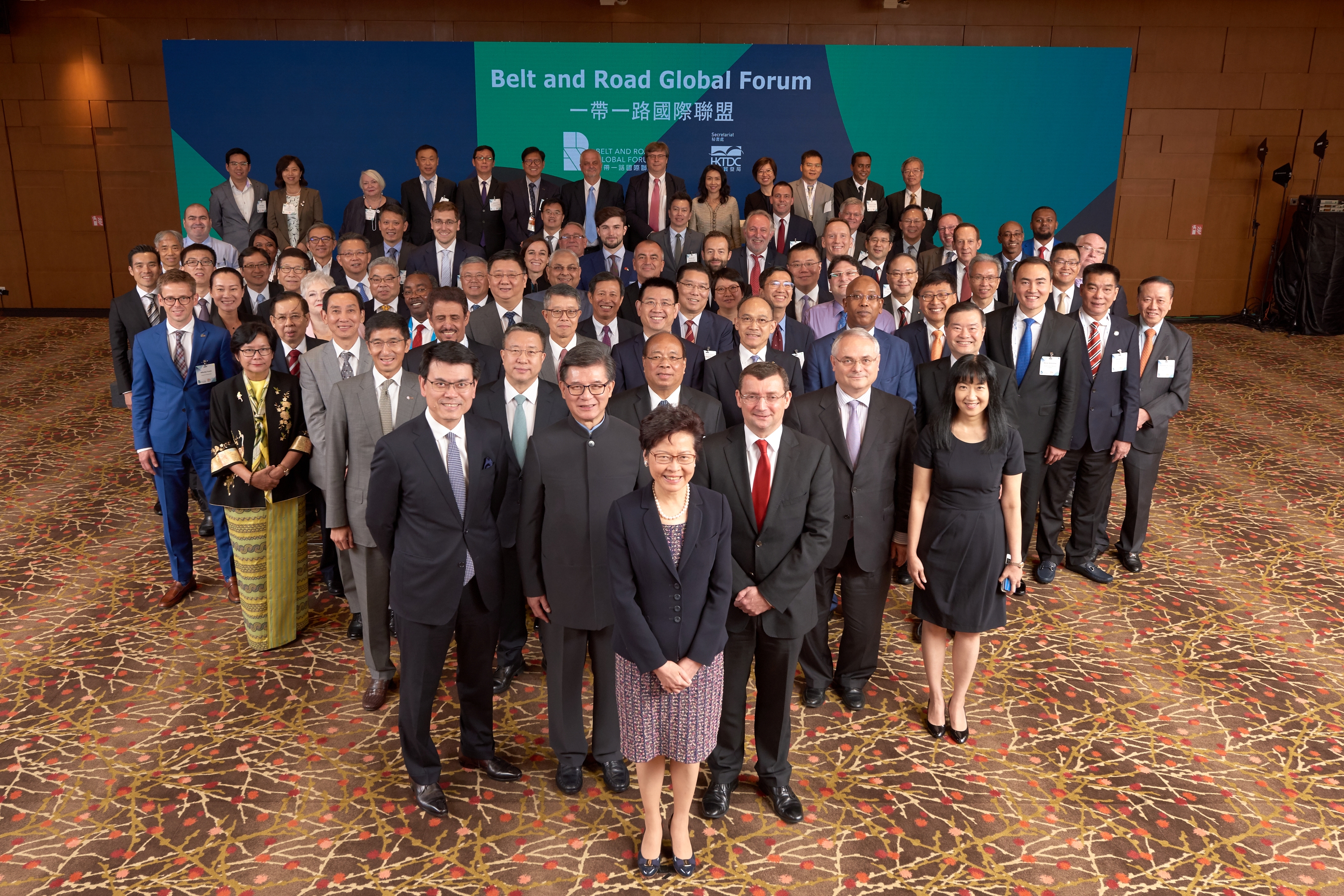The Belt and Road Global Forum was inaugurated with its first annual roundtable in Hong Kong, followed by the third edition of the Belt and Road Summit, where some 5,000 global government and business leaders discussed opportunities to “collaborate for success”.
 The Belt and Road Global Forum inauguration ceremony was officiated by Chief Executive Carrie Lam and attended by more than 80 member organisations from 24 countries
The Belt and Road Global Forum inauguration ceremony was officiated by Chief Executive Carrie Lam and attended by more than 80 member organisations from 24 countries
The Belt and Road Global Forum was officially launched and its first annual roundtable was held on 27 June at the Hong Kong Convention and Exhibition Centre (HKCEC). The inauguration ceremony was officiated by Carrie Lam, Chief Executive of the Hong Kong Special Administrative Region (HKSAR), and attended by more than 80 member organisations from 24 countries.
Formed last October with the Hong Kong Trade Development Council (HKTDC) serving as secretariat, the Forum is a network for chambers of commerce, business associations, investment agencies, research institutes and other related organisations from around the world to exchange information and explore business collaboration under the Belt and Road Initiative through Hong Kong. The Forum currently has a membership of more than 110 organisations from 29 countries and regions.
Topics discussed at the Forum’s first annual roundtable meeting include Belt and Road investment trends, infrastructure financing facilitation, as well as project identification and risk mitigation. Going forward, member organisations can continue to exchange insights and market updates through the Forum's online platform.
Regional opportunities spotlighted at Belt and Road Summit
Another highlight of the week, the third Belt and Road Summit, jointly organised by the HKSAR Government and the HKTDC, was held on 28 June at the HKCEC under the theme “Collaborate for Success”.
Featuring more than 80 speakers and attended by some 5,000 participants from 55 countries and regions, this year’s Summit was the largest to date, reflecting the rapidly-growing collaboration opportunities under the Belt and Road and Hong Kong’s important role as a facilitator and commercial hub for the Initiative.
At the opening session, Hong Kong’s Chief Executive Carrie Lam delivered the opening remarks, Deputy Prime Minister of Thailand Dr Somkid Jatusripitak gave the keynote speech, and Xiao Yaqing, Chairman of China’s State-owned Assets Supervision and Administration Commission of the State Council, Ning Jizhe, Vice Chairman of China’s National Development and Reform Commission, and Gao Yan, Vice Minister of China’s Ministry of Commerce, addressed the audience.
In his welcome remarks, HKTDC Chairman Vincent HS Lo said: “In just four and a half years, the Initiative has achieved significant progress. New projects such as railways and roads, ports and power plants have begun in numerous countries around the world. At the same time, new opportunities are opening up, as the Initiative goes beyond infrastructure to technology, manufacturing, logistics, agriculture, tourism and many others. For something as far-reaching in scope and global in scale as the Belt and Road, we must find the right partners to make the right choices. As the commercial hub for the Belt and Road, Hong Kong is the best place to turn Belt and Road concepts into viable commercial ventures.”
The plenary session, entitled “Action through Collaboration: Case Studies on Signature Belt and Road Projects”, was moderated by Bernard Chan, President of Asia Financial Holdings Ltd. Guest speakers including Liu Qitao, Chairman of China’s Communications Construction Company Ltd, Li Shufu, Vice Chairman of the All-China Federation of Industry and Commerce, Professor Frederick Ma, Chairman of MTR Corporation Ltd, Manuel V Pangilinan, Chairman of Metro Pacific Investments Corporation, and Shinta Widjaja Kamdani, Vice Chairwoman of the Indonesian Chamber of Commerce and Industry, shared their first-hand experience and perspectives as investors and project owners on how to achieve an “all-win” outcome through collaboration.
The Summit also catered to the needs of different sectors by offering a number of thematic breakout forums, including “Risk Mitigation in Infrastructure Financing” co-organised with the HKMA Infrastructure Financing Facilitation Office, “Digital Silk Road” co-organised with Hong Kong Cyberport, “Chinese Infrastructure Investment Trends and Opportunities” co-organised with China International Contractors Association, “Green Finance” co-organised with Hong Kong’s Financial Services Development Council, and “Hong Kong as the Deal Maker and Dispute Resolver” co-organised with the Department of Justice of the HKSAR Government.
Echoing the Summit’s theme of collaboration, the Investment and Business Matching Session was extended to a full day this year, allowing project owners, investors and services providers to engage in face-to-face meetings with potential partners. Project pitching sessions covering key sectors including transport and logistics infrastructure, energy, natural resources and public utilities, and rural and urban development were also held.

 Themed “Collaborate for Success”, the third Belt and Road Summit welcomed some 5,000 government and business leaders from 55 countries and regions
Themed “Collaborate for Success”, the third Belt and Road Summit welcomed some 5,000 government and business leaders from 55 countries and regions
